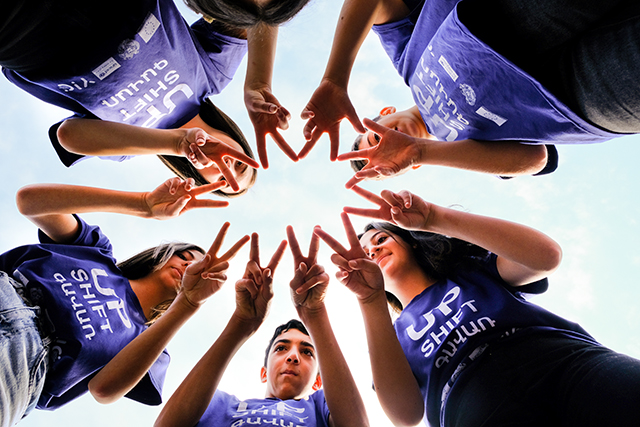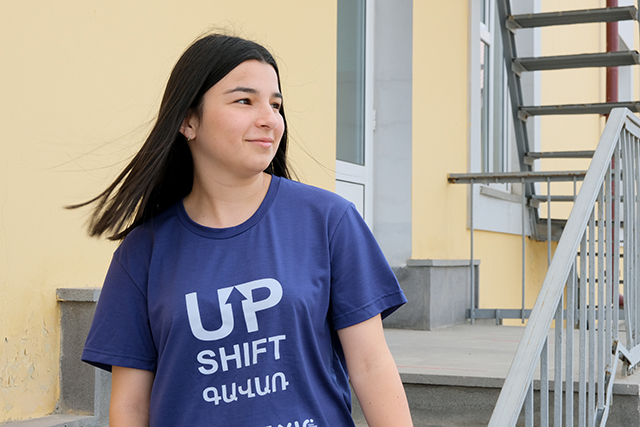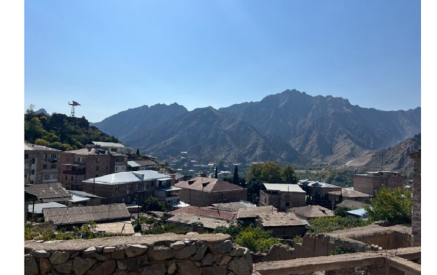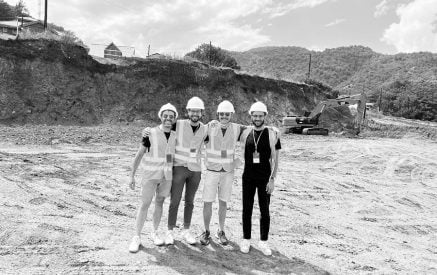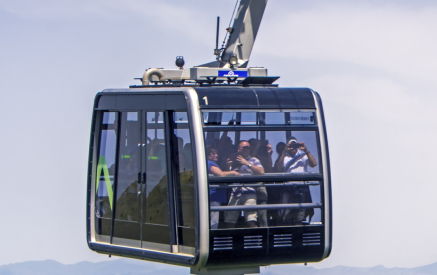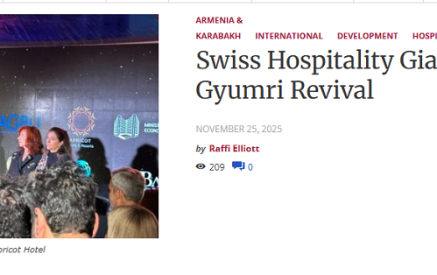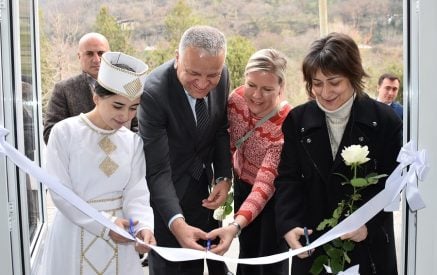Teenagers in the Gegharkunik region of Armenia are developing innovative community projects with the support of the European Union and UNICEF, working through the UPSHIFT programme, which empowers young people to achieve their ideas and stimulate life in their communities.
The programme is part of the ‘Future Today: Empowering women, youth and children for deepening democracy in Armenia’ project, and supports adolescents aged 12-18 to raise community issues and seek solutions. Participants explore new skills such as problem-solving and critical thinking, communication, professional behaviour, and community building, and develop their organisational capacities.
Five UPSHIFT bootcamps have so far been held in Armenia, four of which were supported by the European Union in Shirak, Lori, Gegharkunik, and Tavush regions. The programme gives young people from the regions an opportunity to form teams and receive grants to realise their ideas.
In April this year, UNICEF and the Gyumri Youth Initiatives Centre announced an ideathon for adolescents from the Gavar community of Gegharkunik region. Ten ideas were selected, and the successful participants were given the chance to take part in a two-day ‘Project Initiation and Planning’ course. The teams had the opportunity to work with mentors, who helped them to develop their projects. Five out of the ten ideas were then selected and received funding from the project.
Read also
But such was the quality of the proposals that the remaining five projects also managed to receive funding from Gavar municipality and other organisations – the first time in UPSHIFT’s history that all ten projects have been funded and implemented.
Thanks to UPSHIFT, the adolescents had the opportunity to gain knowledge and experience in areas not covered by the school curriculum. When working with their mentors, they not only designed the plan and budget but also applied to the relevant authorities, made the purchases, and worked on the organisation of their project.
One step closer to their dream
Gavar Secondary School No. 2 stands out from the other schools. Here, in the school yard, the students have built a small greenhouse, in which they grow onions, greens, tomatoes, and peppers. The greenhouse is the initiative of five students who joined the UPSHIFT programme and won a grant of 120,000 drams.
The idea came from 17-year-old Laura Mkrtchyan and her friend Angela, who had studied at the Armat engineering laboratory before applying to the programme. That’s where she came up with the idea of building a smart greenhouse, which could be controlled from an application. But before building a smart greenhouse, they girls began with a normal greenhouse. To bring their idea to life, they involved other pupils from the school and pitched their plans to UPSHIFT.
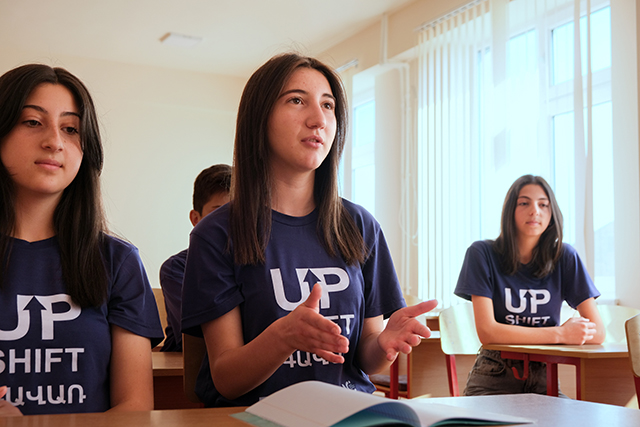
Laura Mkrtchyan
“After much thought, we felt we should include in our team people who have not participated in such programmes before, or have no idea what non-formal education is about,” says Laura, stressing that the experience proved they had made the right decision. “Each member of our team has a special talent. That contributed to achieving our goal.”
Laura says it was important for them to work with the school. They wanted to stimulate the interest of other students and to involve them in the project. And the school administration was happy to allocate a special area for the greenhouse.
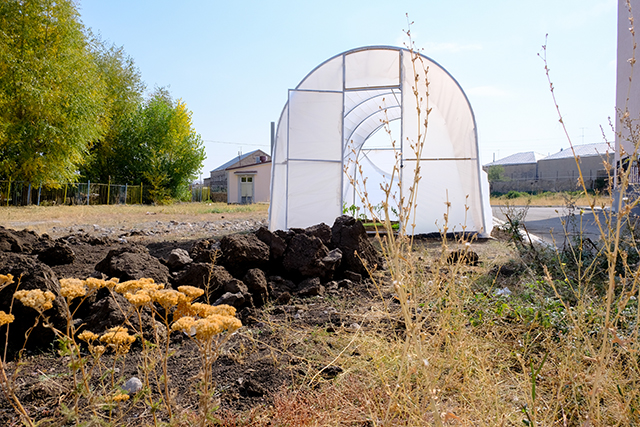
The greenhouse
“Some people thought we couldn’t implement the project, that the money was not enough, that the wind would blow it away, and as a matter of fact, we were very disappointed at the time. Our project did face a lot of obstacles, like any successful project, but we had a determined team committed to caring for this greenhouse in every possible way,” says Laura, adding they had planned for what would happen to the greenhouse after she graduates next year. “The biology teacher will take care of the greenhouse every year together with the students. They will water, harvest, and use the crop in the school canteen. And if they get a lot of the crop, they can also sell it.”
Nevertheless, Laura insists she will not forget about the greenhouse when she graduates, and says will be engaged in its operation as much as possible. She still has a dream of building a smart greenhouse that she is determined to achieve.
Working with the local community
The grant, however, was not enough to build the greenhouse, and parents and residents of the Gavar community offered both practical and fundraising help to make the idea come true.
According to mentor Lena Goharyan, the adolescents now need to think of ways to attract the interest of other students so that the initiative can continue and grow in the coming years.
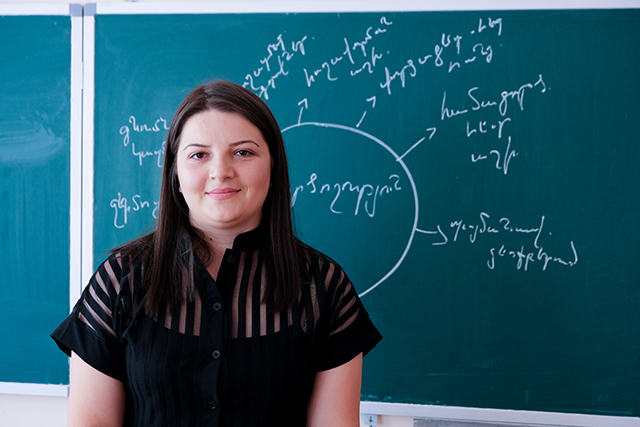
Lena Goharyan
In addition to building the greenhouse, the teenagers, with the support of local residents, organised four agricultural field trips and three expert meetings, involving about 30 young people. Thanks to these field trips, they had the opportunity to see large and small greenhouses, learn more about agricultural approaches, and put their questions to the experts.
The youngest member of the team is 14-year-old Edgar Dvoyan. It was his first time participating in such a project, and his mother, who works at the same school, encouraged him to take part. At first, the boy was reluctant, but after getting involved in the teamwork, he not only became interested in agriculture and greenhouse work, but also began to participate in other similar projects.
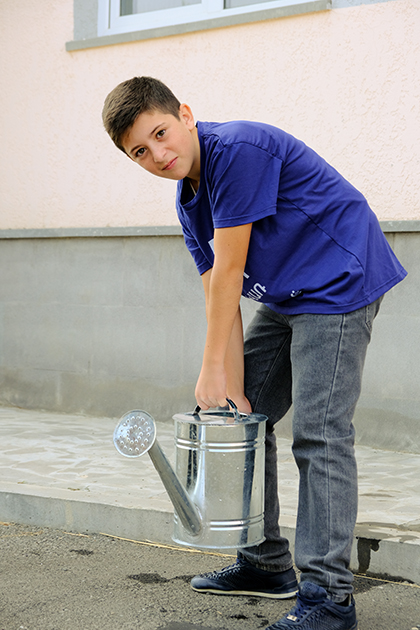
Edgar Dvoyan
“We chose such a project to be useful to the school as well. It wasn’t easy, but when you work as a team, everything becomes easier,” says Edgar, noting that the field trips had really helped in the construction of the greenhouse. The adolescents met professionals with years of experience who shared their knowledge about agriculture and greenhouses.
Edgar says other students at the school are interested in the team’s activities and help them with the greenhouse. And he hopes that when they graduate, the greenhouse will continue to operate and even provide income for the school.
Smart school bell
Over at Gavar School No. 4, pupils had noticed that the school bell would sometimes ring at the wrong time, meaning a teacher always had to be on duty to make sure it went off on time. In response, a group of students also studying at the Armat engineering laboratory decided to develop and install a smart bell programmed with the times of all the lessons and breaks, an idea warmly welcomed by the school administration.
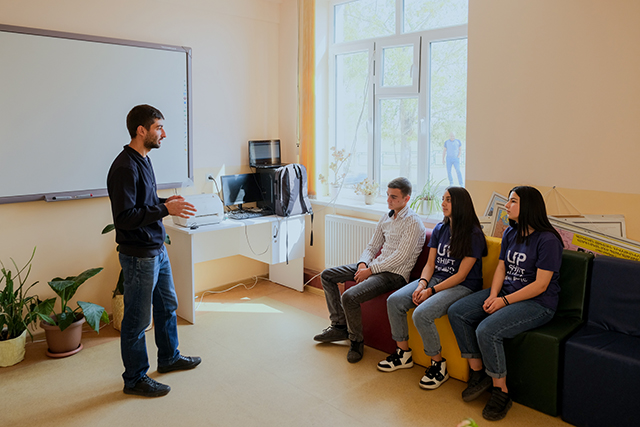
Smart G
When the students heard about UPSHIFT, they applied to the programme in order to share their ‘Smart G’ bell (‘G’ stands for Gavar) with other schools that faced the same problem. The team was made up of three boys and two girls. The boys were involved in the design process and manufacturing the device, while the girls were involved in marketing. As part of the project, they have now designed and installed bells in six schools of the Gavar community.
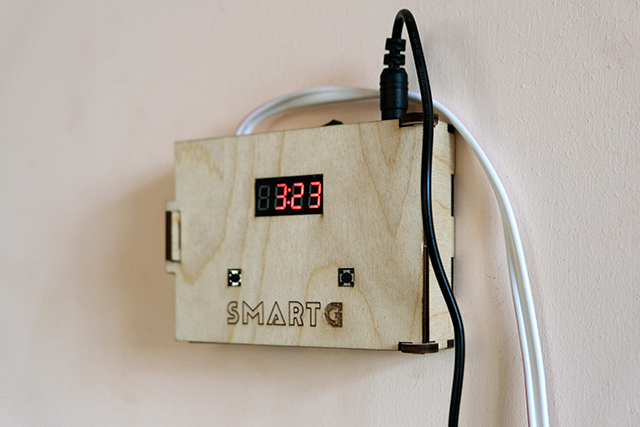
The “Smart G” bell
Sixteen-year-old Narek Khachatryan says they had several ideas when applying for the project, but they thought that by spreading the device they created, they would be more useful to the community. “We are students. We always felt that there was a problem with the bell. We solved that problem at our school. And we realised that the same issue existed in other schools.”
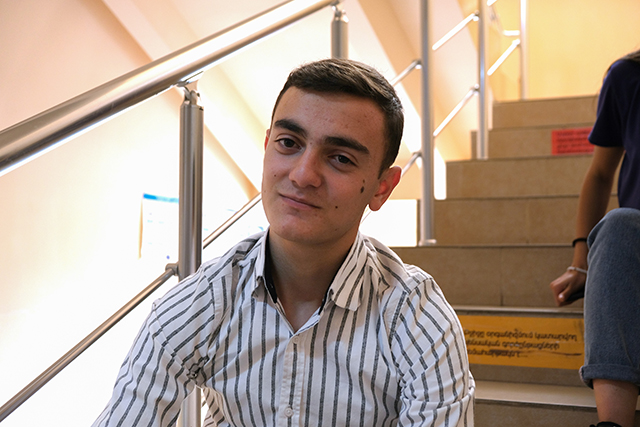
Narek Khachatryan
Having installed the bells in all six schools, the team now plans to meet with students and show that when they notice an issue in the school, they too can try to solve it.
“Thanks to the programme, we were able to share the device we had already created,” says Narek, adding: “It’s a small task, but a big result.”
A first business idea
Fifteen-year-old Anna Mukoyan is responsible for marketing the bell. She remembers initially being sceptical about the project. “Actually, we thought it was a good opportunity to skip lessons, and we went to see what it was. But when we did the work, it seemed very interesting.”
Together with her teammate Alvard, Anna contacted the schools and presented their project. She remembers that at first, some schools had their doubts, but after installing the bell, they only heard words of praise. “For example, one teacher didn’t have classes for two hours, and wanted to spend that time outside, but couldn’t because she had to be on duty to ring the bell. We solved that issue with our device, and now those six schools don’t need bell attendants.”
And since Anna is interested in marketing and wants to become a marketing specialist, she thinks this could be the start of her career. And what will be the future of ‘Smart G’, will it become the teenagers’ first business? The team is still discussing….
200 community ideas
During the four phases of UPSHIFT, Armenian teenagers have proposed and developed about 200 community ideas, 30 of which have been or are being implemented. Awareness raising activities were organised in 50 schools and educational organisations, with the participation of 1,800 young people.
The UPSHIFT adolescent development and community engagement programme had the biggest success in Gegharkunik region in 2022. The programme managed to attract the attention of adolescents, motivating them to implement projects of their interest and develop deeper and more specialised knowledge. The adolescents also inspire other community members and younger students to create something new or continue taking care of what they’ve created. And most importantly, these seemingly small initiatives change lives and create a culture of innovation in the community.
UPSHIFT aims at 12-18-year-old adolescents to form teams of five people and present ideas for a community project. Each team has its own mentor to help the adolescents to develop their idea, design, and implement the project.
Ami CHICHAKYAN
This article was produced in the framework of the ‘EU NEIGHBOURS east’ project. The views expressed are solely those of the author of the article.



















































